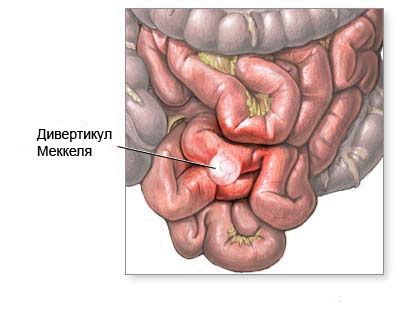
All iLive content is medically reviewed or fact checked to ensure as much factual accuracy as possible.
We have strict sourcing guidelines and only link to reputable media sites, academic research institutions and, whenever possible, medically peer reviewed studies. Note that the numbers in parentheses ([1], [2], etc.) are clickable links to these studies.
If you feel that any of our content is inaccurate, out-of-date, or otherwise questionable, please select it and press Ctrl + Enter.
Meckel's diverticulum
Medical expert of the article
Last reviewed: 12.07.2025
Meckel's diverticulum is a congenital sac-like diverticulum of the distal ileum, occurring in 2-3% of people. It is usually located within 100 cm of the ileocecal valve and often contains heterotopic gastric and/or pancreatic tissue. Symptoms of Meckel's diverticulum are uncommon but include bleeding, bowel obstruction, and signs of inflammation (diverticulitis). Diagnosis is difficult and radionuclide and barium studies are often necessary. Treatment of Meckel's diverticulum is surgical removal.
What causes Meckel's diverticulum?
In the early embryonic stage, the vitelline duct, which extends from the terminal ileum to the umbilicus and yolk sac, usually becomes obliterated by the 7th week. If the portion of it that connects to the ileum does not atrophy, a Meckel's diverticulum is formed. This congenital diverticulum is located at the opposite margin of the bowel from the mesenteric attachment and contains all layers of normal bowel. Approximately 50% of diverticula also contain heterotopic tissue from the stomach (and thus contain parietal cells that secrete HCI), pancreas, or both.

Only about 2% of people with Meckel's diverticulum develop complications. Although diverticula occur equally in men and women, men are 2 to 3 times more likely to develop complications. Complications include bleeding, obstruction, diverticulitis, and tumors. Bleeding is more common in young children (under 5 years of age) and occurs when acid secreted by the ectopic gastric mucosa in the diverticulum causes ulceration of the ileum. Intestinal obstruction can occur at any age but is more common in older children and adults. In children, intussusception of the diverticulum is the most likely cause. Obstruction may also result from adhesions, volvulus, foreign bodies, tumors, or strangulation in a hernia (Littre's hernia). Acute Meckel's diverticulitis can occur at any age but has a peak incidence in older children. Tumors, including carcinoid, are rare and develop mainly in adults.
Symptoms of Meckel's diverticulum
Intestinal obstruction in all ages is characterized by cramping abdominal pain, nausea, and vomiting. Acute Meckel's diverticulitis is characterized by abdominal pain and tenderness to palpation, usually localized below or to the left of the umbilicus; the pain is often accompanied by vomiting and is similar to appendicitis, except for the location of the pain.
Children may have recurrent episodes of painless, bright red rectal bleeding that is usually not severe enough to cause shock. Bleeding may also occur in adults, usually as melena rather than pure blood.
Diagnosis of Meckel's diverticulum
The diagnosis of Meckel's diverticulum is difficult and the choice of investigation is based on the presentation of features. If rectal bleeding from a Meckel's diverticulum is suspected, a 99m Tc pertechnetate scan may identify ectopic gastric mucosa and hence the diverticulum. Patients with abdominal pain and local tenderness should undergo abdominal CT with oral contrast. In patients with vomiting and obstructive symptoms, abdominal radiographs in the upright and horizontal position are preferentially obtained. Occasionally the diagnosis is made only by surgical treatment for suspected appendicitis; whenever an intact appendix is found, Meckel's diverticulum should be suspected.
What do need to examine?
How to examine?
Treatment of Meckel's diverticulum
Patients with intestinal obstruction due to Meckel's diverticulum require emergency surgical care.
A diverticulum complicated by bleeding with induration of the adjacent ileum requires resection of this portion of the intestine and the diverticulum. A diverticulum complicated by bleeding without induration of the ileum requires resection of the diverticulum only.
Meckel's diverticulitis also requires resection. Small, asymptomatic Meckel's diverticula encountered incidentally during laparotomy do not require removal.


 [
[